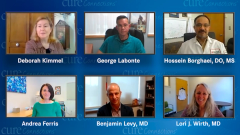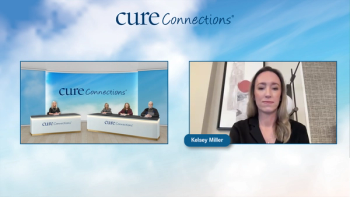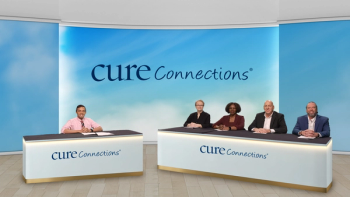
Rationale for Molecular Testing in Real-World Scenarios
The rationale for testing 2 patients with cancer, Deborah and George, with molecular testing prior to managing their cases with novel therapy.
Episodes in this series

Hossein Borghaei, DO, MS: I want to bring our special guests into this. It’s important to get a little background, to get your story in all this, Ms. [Deborah] Kimmel and Mr. [George] Labonte. Let me start by asking your respective physicians what made them actually do the molecular testing in your cases. We’ve covered a lot, so hopefully this won’t be a long discussion. But I want to know, was something special about the case that you needed to immediately do the molecular testing? Or was it that, regardless of the clinical scenario, if somebody with metastatic lung cancer walks into your clinic, molecular testing is done on day 1?
Benjamin Levy, MD: Do you want my perspective on this? Because Deborah is unique and brings up many of the things that we already discussed. She may not remember this—she probably does because she’s a smart cookie—but she had a high PD-L1 when we started. This was in 2018, and I told her at the time we didn’t really know about whether we could mix these drugs together. She’s a never-smoker and clearly needed molecular testing. But I would say that even if she weren’t a never-smoker, or even if she was a former smoker or a current smoker, all patients need to be tested. It really doesn’t make a difference. That’s another big nugget that needs to be disseminated—every patient, independent of their smoking history, needs to be tested for these genes. She had a high PD-L1, and she got a dose of immunotherapy first—Deborah, correct me if I’m wrong. Then we found the ALK because in 2018, it took forever to get ALK testing done. We finally did, and we switched her to a targeted therapy. But that’s the unique part of her story, as I recall—Deborah, correct me if I’m wrong. The teaching point, from my standpoint, is that everyone gets tested. Doesn’t matter if you’re a former smoker or a never-smoker. Everyone gets tested. She’s part of the Johns Hopkins [Sidney Kimmel Cancer Center] program, so she got tested.
Hossein Borghaei, DO, MS: Dr. Wirth, was it the same scenario with you?
Lori Wirth, MD: Not quite. We did testing for Mr. Labonte in 2016, and this was before we could necessarily do anything with the results. We did find a somatic RET mutation, and this was before we had any clinical trials with the RET-specific inhibitors that were underway. But we wanted the information because we knew those clinical trials were coming down the pike. We did it to get our ducks in order and did find a RET mutation that we were able to do something about awhile thereafter.
This transcript has been edited for clarity.


